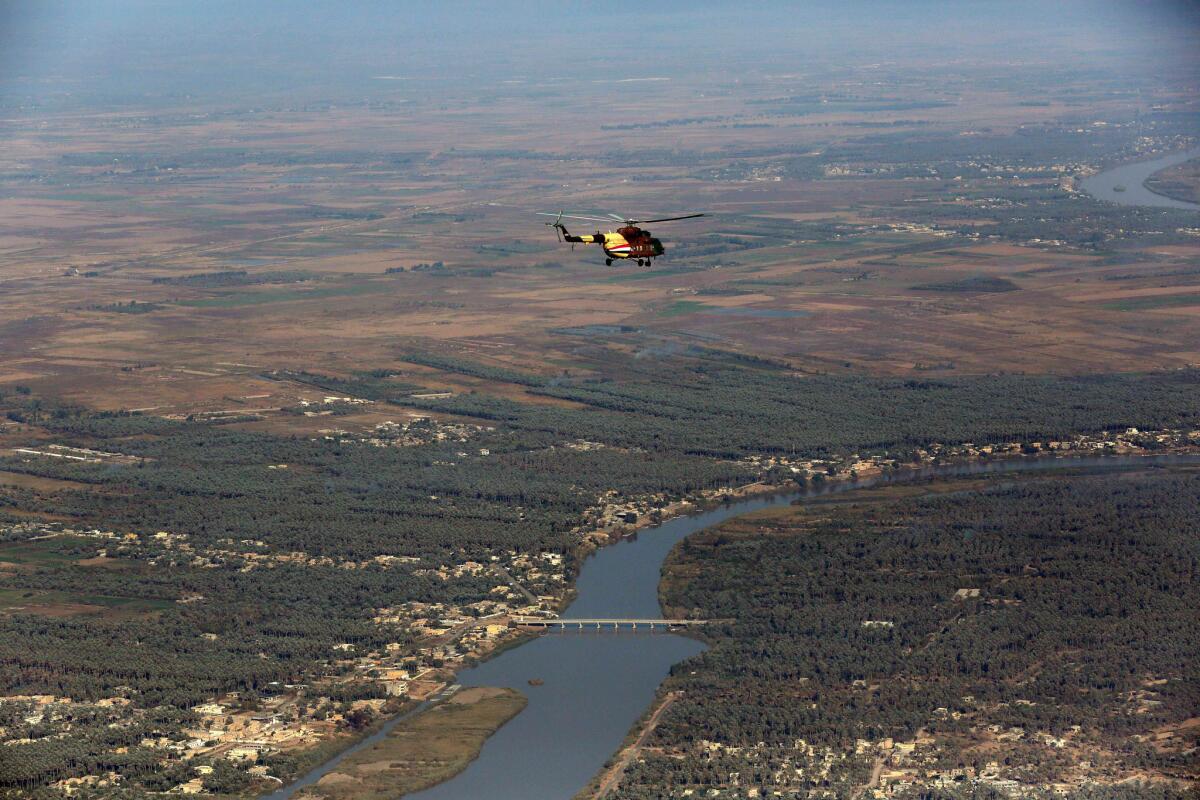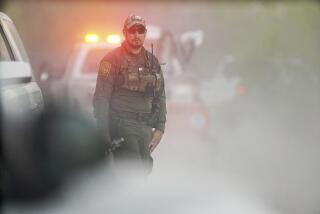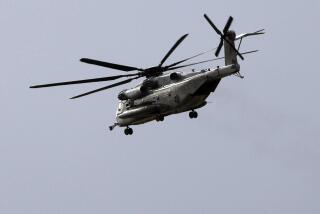Iraqi military helicopter shot down by Islamic State near Samarra

An Iraqi military helicopter has been shot down by Islamic State militants near the Sunni-dominated city of Samarra, killing the two pilots. The Sunni extremists also were reported on the verge of taking a western Iraq town from poorly equipped government forces.
Iraqi news reports said Saturday that the military helicopter had been shot down near Mutassem, a strategic entry to the Shiite Muslim holy city of Samarra about 80 miles north of the capital.
It wasn’t immediately clear what type of helicopter was shot down, or exactly when. Iraq’s Alhurra television channel reported that a helicopter was shot down Saturday, as did the Associated Press, but antigovernment activists claimed that one helicopter, maybe two, were downed Friday.
Iraqi defense ministry officials in Samarra said they could not confirm details of the crash.
Central Samarra has been secured by the Iraqi army and several Shiite militias that have led the battle against Islamic State, which controls much of northern and western Iraq as well as parts of Syria.
The extremists wrested control of Mutassem from the government three months ago, touting the victory online with a series of graphic photos showing Iraqi soldiers’ corpses in the streets. U.S. and Iraqi forces have tried to retake the area through airstrikes that so far have proved unsuccessful, although the Iraqi government said Saturday that it had liberated Mutassem.
Islamic State in recent months shot down at least two other Iraqi military helicopters near Baiji, a city in central Iraq that is home to a lucrative refinery that would prove a strategic coup for the group.
Islamic State on Saturday also attacked the village of Wafaa in Anbar province, killing police officers and trapping government officials in the community about 90 miles west of Baghdad.
Antigovernment activists tweeted that the provincial council had declared the fall of the village. However, Wafaa officials reached late Saturday said they were still fending off the attack, but they were running out of ammunition.
“We ... have been surrounded for three days and have no supplies. We are dying a slow death here,” said Mayor Hussein Kassaar, “We have been clamoring for support for two months, but now we are screaming for it. Give us equipment!”
The leader of the provincial council echoed his plea.
“We require more support so as to be able to change the course of the battle,” said Sabaah Karhout, reached by phone in the northern city Irbil.
Wafaa is a strategic village on the highway that connects the region to Jordan. Losing control to Islamic State would be a blow not just to local officials, but to Iraq’s central government.
Naim Kaood, head of Anbar’s pro-government Albu Nimr tribe, complained that officials in Baghdad have been too slow to arm local forces to fend off such attacks.
“If we don’t get these weapons, Anbar will completely collapse and will fall in the hands of Daesh,” said Kaood, using another acronym for Islamic State.
The attacks Saturday were not unexpected. Islamic State has been fanning out across, Sunni-dominated Anbar province in Iraq’s west.
Its fighters have also become entrenched in Sunni-led areas around Samarra. Radical Shiite cleric Muqtada Sadr recently placed his militia on alert to go to battle with the Sunni militants for the city, home to a Shiite mosque whose bombing eight years ago deepened the country’s sectarian divide.
Khaled Khazraji, vice president of the security committee for surrounding Salahuddin province, said Saturday that military reinforcements had arrived to bolster local security after the helicopter attack.
“This operation … will pave the way for a wider operation to liberate the center of the province” from Islamic State, Khazraji said in an interview with Iraq’s Sumariya news outlet.
Bulos is a special correspondent. Special correspondent Ramin Mostaghim contributed to this report from Tehran.
More to Read
Start your day right
Sign up for Essential California for news, features and recommendations from the L.A. Times and beyond in your inbox six days a week.
You may occasionally receive promotional content from the Los Angeles Times.







